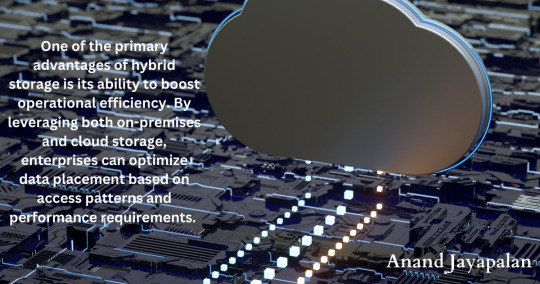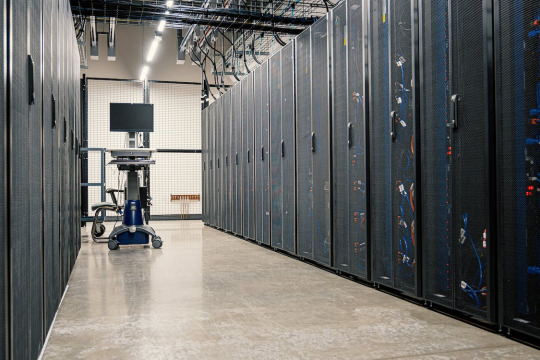#anand jayapalan
Explore tagged Tumblr posts
Text
Anand Jayapalan on Why Software-Defined Storage is the Key to Future-Proofing Your Data Infrastructure
Anand Jayapalan: Exploring Software-Defined Storage as the Future of Scalable and Flexible Data Solutions
In today’s rapidly evolving technological landscape, the need for scalable and flexible data solutions has reached an all-time high. As businesses generate vast amounts of data, traditional storage methods are increasingly being pushed beyond their limits. This is where Software-Defined Storage (SDS) emerges as a game-changer. For data storage solutions experts like Anand Jayapalan, SDS represents a transformative approach that decouples storage hardware from the software that manages it. This separation offers unparalleled scalability, flexibility, and efficiency—crucial for meeting the demands of modern, data-driven enterprises.

In today's rapidly evolving technological landscape, the demand for scalable and flexible data solutions has never been higher. As businesses continue to generate massive amounts of data, traditional storage methods are increasingly being stretched to their limits. This is where Software-Defined Storage (SDS) steps in as a game-changer. By decoupling storage hardware from the software that manages it, SDS offers unprecedented levels of scalability, flexibility, and efficiency that are essential for modern data-driven enterprises.
As organizations grow and their data needs expand, the ability to scale storage solutions without significant hardware investments becomes critical. SDS allows companies to do just that by leveraging commodity hardware and abstracting the storage management layer. This abstraction enables businesses to scale their storage capacity seamlessly, whether they are handling on-premises data, cloud storage, or a hybrid environment. With SDS, the days of being locked into expensive, proprietary storage solutions are numbered.
Moreover, the flexibility offered by SDS is unmatched. It provides the agility needed to adapt to changing data requirements and workloads without the need for disruptive hardware upgrades. Whether you're dealing with structured or unstructured data, SDS can dynamically allocate resources to meet the specific demands of your applications. This level of customization ensures that businesses can optimize their storage infrastructure to maximize performance while minimizing costs.
The Advantages of Implementing Software-Defined Storage in Your Organization
One of the most significant benefits of SDS is its ability to simplify storage management. Traditional storage solutions often require specialized knowledge and manual intervention to manage, scale, and troubleshoot. In contrast, SDS automates many of these processes, reducing the need for specialized skills and allowing IT teams to focus on more strategic initiatives. This automation not only improves efficiency but also reduces the risk of human error, which can lead to data loss or downtime.
Another critical advantage of SDS is its ability to enhance data availability and resilience. By distributing data across multiple nodes and providing built-in redundancy, SDS ensures that your data is always accessible, even in the event of hardware failures. This level of reliability is essential for businesses that rely on uninterrupted access to their data for daily operations.
Finally, SDS delivers substantial cost savings compared to traditional storage solutions. By utilizing off-the-shelf hardware and minimizing reliance on costly, proprietary systems, businesses can achieve equivalent levels of performance and reliability at a fraction of the cost. For IT professionals like Anand Jayapalan, SDS's ability to scale storage resources as needed is particularly advantageous, ensuring that companies pay only for the storage they use, rather than over-provisioning to anticipate future growth.
0 notes
Text
Anand Jayapalan et al.
SEC Charges Technology Company Insider with Tipping Family Members Ahead of Acquisition from News About Securities Fraud https://www.sec.gov/litigation/litreleases/2017/lr23952.htm
0 notes
Text
Anand Jayapalan on the Benefits of Hybrid Storage Solutions for Enterprises Maximizing Efficiency and Flexibility
Anand Jayapalan: The Benefits of Hybrid Storage Solutions for Enterprises
In today's data-driven world, enterprises are constantly seeking ways to manage their growing volumes of data more efficiently and cost-effectively. For data storage solutions experts such as Anand Jayapalan, one solution that has gained significant traction is hybrid storage, which combines the best of both on-premises and cloud storage. This approach offers a range of benefits, enhancing efficiency, flexibility, and overall cost-effectiveness. Let's explore how hybrid storage can optimize your data management strategy.

Enhanced Efficiency
One of the primary advantages of hybrid storage is its ability to boost operational efficiency. By leveraging both on-premises and cloud storage, enterprises can optimize data placement based on access patterns and performance requirements. Frequently accessed data, or "hot data," can be stored on high-performance, on-premises storage systems for quick access, while less frequently accessed data, or "cold data," can be moved to the cloud, where storage costs are typically lower.
This strategic data placement reduces the burden on on-premises storage systems, ensuring that they remain responsive and efficient. Additionally, hybrid storage solutions often come with advanced data management features, such as automated tiering and data migration, which further streamline operations and reduce manual intervention.
Increased Flexibility
Hybrid storage solutions offer unparalleled flexibility, allowing enterprises to adapt to changing business needs and data workloads. With the ability to scale storage resources up or down based on demand, organizations can avoid the pitfalls of over-provisioning or under-provisioning their storage infrastructure.
For instance, during peak periods, such as end-of-quarter financial reporting or product launches, enterprises can temporarily expand their cloud storage capacity to handle the increased data load. Once the demand subsides, they can scale back down, ensuring that they only pay for the storage they actually use. This flexibility is particularly beneficial for businesses with fluctuating data volumes and dynamic workloads.
Cost-Effectiveness
Cost management is a critical consideration for any enterprise, and hybrid storage solutions can significantly enhance cost-effectiveness. By balancing on-premises and cloud storage, organizations can optimize their storage spending. Cloud storage is typically priced based on consumption, allowing businesses to pay only for the storage they need. This pay-as-you-go model can lead to substantial cost savings, particularly for archival and backup data that doesn't require high-performance storage.
Moreover, hybrid storage can help enterprises avoid the significant capital expenditures associated with expanding on-premises storage infrastructure. Instead of investing in costly hardware upgrades, businesses can leverage the virtually limitless capacity of cloud storage to accommodate their data growth.

Improved Data Protection and Disaster Recovery
Hybrid storage solutions also bolster data protection and disaster recovery capabilities. By replicating critical data to the cloud, enterprises can ensure that their data is safeguarded against hardware failures, natural disasters, or cyberattacks. In the event of an on-premises system failure, data can be quickly restored from the cloud, minimizing downtime and ensuring business continuity.
Furthermore, many cloud providers offer advanced security features, such as encryption, multi-factor authentication, and compliance with industry standards, providing an additional layer of protection for sensitive data.
Optimized Data Management Strategy
Implementing a hybrid storage solution can optimize an enterprise's overall data management strategy. By seamlessly integrating on-premises and cloud storage, businesses can create a unified storage environment that supports a wide range of applications and workloads.
This integrated approach enables enterprises to leverage the strengths of both storage types, achieving a balance between performance, cost, and scalability. Additionally, hybrid storage solutions often come with comprehensive management tools that provide visibility and control over the entire storage infrastructure, simplifying administration and enhancing operational efficiency.
Hybrid storage solutions offer a compelling blend of efficiency, flexibility, and cost-effectiveness, making them an ideal choice for modern enterprises. According to IT professionals and data storage solutions experts like Anand Jayapalan, by combining on-premises and cloud storage, businesses can optimize their data management strategies, improve data protection, and adapt to changing needs with ease. Embracing hybrid storage can ultimately lead to more efficient operations, reduced costs, and a more agile, resilient enterprise.
0 notes
Text
Anand Jayapalan on Harnessing Big Data with Enterprise Storage Solutions to Maximize Business Potential
Anand Jayapalan: Leveraging Big Data with Enterprise Storage Solutions
Businesses are continuously seeking ways to gain a competitive edge, optimize operations, and enhance decision-making processes. According to data storage solutions experts such as Anand Jayapalan, one of the most transformative developments in recent years has been the advent of big data. When paired with advanced enterprise storage solutions, big data has the potential to revolutionize how businesses operate. This blog explores strategies to harness the power of big data through advanced storage solutions to improve decision-making, efficiency, and competitive advantage.

The Power of Big Data
Big data refers to the vast volumes of structured and unstructured data generated by businesses every day. This data comes from various sources, including customer transactions, social media interactions, IoT devices, and more. The sheer volume, variety, and velocity of this data can be overwhelming, but it also holds valuable insights that can drive business growth and innovation.
Advanced Enterprise Storage Solutions
To effectively leverage big data, businesses need robust storage solutions that can handle the scale and complexity of their data. Advanced enterprise storage solutions, such as software-defined storage (SDS), cloud storage, and hybrid storage systems, provide the necessary infrastructure to store, manage, and analyze large datasets.
Software-Defined Storage (SDS): SDS decouples storage hardware from the software that manages it, allowing businesses to scale storage resources dynamically and manage them more efficiently. This flexibility is crucial for handling the unpredictable nature of big data.
Cloud Storage: Cloud storage solutions offer scalability, cost-effectiveness, and accessibility. Businesses can store vast amounts of data without investing heavily in on-premises infrastructure. Additionally, cloud storage providers often offer advanced analytics tools that can be integrated with stored data for real-time insights.
Hybrid Storage Systems: Hybrid systems combine on-premises and cloud storage and offer the best of both worlds. They provide the security and control of local storage while leveraging the scalability and flexibility of the cloud.
Strategies for Leveraging Big Data
Data Integration and Management:
Effective data integration is the foundation of a successful big data strategy. Businesses must ensure that data from various sources is seamlessly integrated and managed. Advanced storage solutions facilitate this by providing unified data management platforms that streamline data consolidation and accessibility.
Real-Time Analytics:
With advanced storage solutions, businesses can perform real-time analytics on their data. This enables them to make data-driven decisions quickly, respond to market changes, and capitalize on emerging opportunities. For example, real-time customer behavior analysis can help businesses tailor their marketing strategies to individual preferences, enhancing customer engagement and satisfaction.
Predictive Analytics:
Leveraging big data for predictive analytics allows businesses to anticipate trends, identify potential risks, and make proactive decisions. Advanced storage solutions provide the computational power and scalability needed to process large datasets and run complex predictive models.

Enhanced Security and Compliance:
Managing large volumes of data comes with significant security and compliance challenges. Advanced storage solutions offer robust security features, such as encryption, access controls, and automated compliance monitoring, ensuring that sensitive data is protected and regulatory requirements are met.
Improved Operational Efficiency:
Big data analytics can identify inefficiencies and bottlenecks in business operations. By analyzing data from various processes, businesses can streamline workflows, reduce costs, and improve overall operational efficiency. For instance, supply chain data analysis can optimize inventory management, reduce waste, and improve delivery times.
Gaining a Competitive Advantage
By harnessing the power of big data through advanced enterprise storage solutions, businesses can gain a significant competitive advantage. They can make more informed decisions, respond swiftly to market dynamics, and innovate faster than their competitors. Additionally, the insights derived from big data can drive product development, enhance customer experiences, and open new revenue streams.
Incorporating big data into business strategies is no longer optional; it's a necessity for staying competitive in today's data-driven world. For IT professionals like Anand Jayapalan, advanced enterprise storage solutions provide the infrastructure needed to store, manage, and analyze big data effectively. By leveraging these technologies, businesses can transform their operations, enhance decision-making, and secure a competitive edge in their industry. Embrace the power of big data and advanced storage solutions to unlock new possibilities and drive your business forward.
0 notes
Text
Anand Jayapalan on the Role of Cloud Storage in Enterprise Solutions: Enhancing Efficiency and Security
Anand Jayapalan: Understanding the Role of Cloud Storage in Modern Enterprise Solutions
In today's fast-paced digital landscape, enterprise storage solutions are crucial for businesses to efficiently manage and secure their data. For IT professionals and data storage solutions experts, including Anand Jayapalan, cloud storage has emerged as a vital component of these solutions, offering numerous advantages that can significantly enhance business operations. This article explores the role of cloud storage in enterprise solutions, focusing on hybrid storage solutions, cost savings, accessibility, and security.

Hybrid Storage Solutions
One of the most significant advantages of cloud storage is its ability to seamlessly integrate with existing on-premises storage systems, creating hybrid storage solutions. This integration allows businesses to leverage the best of both worlds: the scalability and flexibility of cloud storage combined with the control and performance of on-premises systems.
Hybrid storage solutions enable businesses to store frequently accessed data locally while offloading less critical data to the cloud. This approach not only optimizes performance but also ensures that data is readily available when needed. Additionally, hybrid storage solutions can facilitate smoother transitions to cloud-based environments, allowing businesses to migrate their data gradually without disrupting operations.
Cost Savings
Cost savings are a primary driver for businesses adopting cloud storage. Traditional on-premises storage solutions often require significant capital investments in hardware, maintenance, and upgrades. In contrast, cloud storage operates on a subscription-based model, allowing businesses to pay only for the storage they use. This model reduces upfront costs and provides predictable monthly expenses, making budgeting more manageable.
Moreover, cloud storage eliminates the need for physical infrastructure, reducing costs associated with energy consumption, cooling, and physical space. Businesses can also avoid the expenses and complexities of maintaining and upgrading hardware as the cloud service provider manages these responsibilities.
Accessibility
Cloud storage offers unparalleled accessibility, enabling businesses to access their data from anywhere at any time. This accessibility is particularly beneficial in today's increasingly remote and mobile workforce, where employees need to access data and collaborate in real-time from various locations.
Cloud storage solutions often come with advanced collaboration tools, allowing multiple users to work on the same document simultaneously, share files easily, and track changes in real-time. This level of accessibility not only enhances productivity but also supports better decision-making by ensuring that employees have access to the most up-to-date information.

Security
Data security is a top priority for businesses, and cloud storage providers invest heavily in advanced security measures to protect their clients' data. These measures include encryption, multi-factor authentication, and regular security audits to ensure that data remains safe from unauthorized access and cyber threats.
Cloud storage providers also offer robust disaster recovery solutions, ensuring that data is backed up and can be quickly restored in the event of a hardware failure, natural disaster, or cyber-attack. This level of security and redundancy provides businesses with peace of mind, knowing that their data is protected and can be recovered in case of an emergency.
In conclusion, cloud storage plays a pivotal role in modern enterprise storage solutions by offering hybrid storage options, cost savings, enhanced accessibility, and robust security measures. For data storage solutions experts like Anand Jayapalan, by integrating cloud storage into their operations, businesses can achieve greater flexibility, scalability, and efficiency, ultimately driving growth and innovation. As the digital landscape continues to evolve, cloud storage will remain a critical component of enterprise storage strategies, helping businesses stay competitive and resilient in an ever-changing market.
0 notes
Text
Anand Jayapalan: The Role of Software Solutions in Enhancing Storage Performance and Lowering Operational Expenses
Anand Jayapalan: How Software Solutions Optimize Performance and Reduce Costs
In the digital era, the efficiency and reliability of storage systems are paramount. As data volumes surge, organizations face the challenge of managing this deluge efficiently while curbing operational costs. For data storage and IT experts, including Anand Jayapalan, advanced software solutions are emerging as transformative agents in this landscape, fundamentally altering how data is stored, accessed, and managed.

The crux of the transformation lies in the intelligent optimization of storage systems. Software-defined storage (SDS) solutions, for instance, abstract the storage hardware, allowing management and automation features to be programmed directly into the software. This shift not only enhances the flexibility of data storage configurations but also optimizes performance by enabling systems to adapt dynamically to varying workloads.
Performance optimization is a critical benefit of advanced software solutions in storage systems. Traditional storage setups often operate in silos, with hardware and software tightly integrated, limiting the ability to scale and respond to changing demands efficiently. In contrast, software solutions can continuously analyze data access patterns and workload requirements, reallocating resources in real time to avoid bottlenecks and maximize throughput. This adaptive approach ensures optimal performance, even as demands evolve.
Moreover, the role of artificial intelligence (AI) and machine learning (ML) in storage systems underscores a significant leap toward automation and efficiency. AI-enhanced software can predict future storage needs by analyzing historical data trends, enabling proactive resource allocation. This predictive capability not only improves performance but also reduces the incidence of system overloads or crashes, thus enhancing overall system reliability.
Data management is another area revolutionized by advanced software. With the exponential growth of data, managing it effectively is becoming increasingly complex. Software solutions facilitate sophisticated data management strategies such as automated tiering and snapshot management. Automated tiering ensures that data is stored on the most appropriate media type based on its usage frequency and criticality, which can significantly reduce storage costs and improve system performance.
Software facilitates snapshot management, which allows for frequent and reliable data backups without substantial performance degradation. These snapshots are crucial for disaster recovery and data analysis, providing organizations with snapshots of their data at various points in time. This capability ensures that critical data can be restored quickly, minimizing downtime and the associated costs.
Cost reduction is perhaps the most compelling advantage of deploying advanced software in storage systems. By automating many of the tasks traditionally performed manually, such as data backup, archiving, and recovery, software solutions significantly reduce the need for extensive human intervention. This automation not only speeds up operations but also decreases the likelihood of human error, which can be costly.

The integration of cloud-based technologies with on-premise storage solutions through software also offers a flexible, scalable approach to data storage that can be more cost-effective than traditional methods. Hybrid storage environments allow data and applications to move seamlessly between private data centers and public clouds, optimizing costs and performance according to the organization's needs.
In conclusion, the transformative impact of software solutions on storage systems is profound and multifaceted. From performance optimization and enhanced data management to significant reductions in operational costs, these advanced software tools are setting new benchmarks in the storage domain. For data storage and IT experts like Anand Jayapalan, as organizations continue to navigate the complexities of data management, the strategic deployment of such technologies will be crucial in harnessing the full potential of their data infrastructure.
0 notes
Text
Anand Jayapalan: Leveraging Data Analytics for Enhanced Enterprise Storage Solutions
Anand Jayapalan: The Crucial Role of Data Analytics in Enterprise Storage Solutions
Data analytics in enterprise storage solutions involves the strategic implementation of advanced data analysis techniques to meticulously optimize storage systems within companies of all sizes. For IT and data storage experts like Anand Jayapalan, organizations can acquire invaluable insights into intricate storage usage patterns and performance metrics and pinpoint potential areas for refinement and enhancement by effectively harnessing the power of analytics. This data-centric methodology empowers companies to not only make well-informed decisions but also elevate storage efficiency to unprecedented levels. Moreover, it enables them to seamlessly align their storage infrastructure with the overarching business objectives, fostering a climate of heightened productivity and cost-effectiveness throughout the organizational spectrum.

Improving Operational Efficiencies and User Experiences Data analytics plays a pivotal role in empowering companies to delve deep into storage performance metrics, understand usage patterns comprehensively, and pinpoint potential bottlenecks hindering operational efficiency. Through meticulous analysis of this data treasure trove, organizations can fine-tune storage allocation strategies, anticipate future capacity requirements, and enhance the overall efficacy of their systems. Noteworthy here is the paramount importance of user experience. Leveraging analytics not only allows for the identification of issues like sluggish response times, latency challenges, or other performance-related bottlenecks but also equips companies with the foresight to proactively tackle these concerns. This proactive approach ensures a seamless and top-notch experience for users, fostering customer satisfaction and loyalty.
Enhancing Compliance, Regulatory, and Security Processes Compliance requirements necessitate strong data management and security protocols. Analytics play a vital role in overseeing data access, guaranteeing adherence to regulations like GDPR or HIPAA, and flagging unauthorized activities. Through the examination of access logs, audit trails, and security events, organizations can pinpoint vulnerabilities, avert data breaches, and uphold regulatory standards.
Fostering Innovation and Advancing New Product Development Data analytics offers valuable insights into customer behavior, market trends, and emerging opportunities. This information empowers companies to innovate by developing new products or improving existing ones. For instance, by examining user preferences and feedback, businesses can craft specialized storage solutions tailored to different industries or specific use cases.
Enhancing Cloud Management As companies increasingly transition to multi-cloud environments, the role of analytics becomes pivotal. Through analytics, businesses can effectively oversee data management spanning various cloud providers, streamline cost-efficiency measures, and uphold data accessibility standards. By delving into performance metrics, cost structures, and data movement patterns, organizations are empowered to gather comprehensive insights for strategic decision-making regarding workload deployment and data replication strategies.

Utilizing Edge Computing and Distributed Analytics Edge computing entails processing data in proximity to its source, such as IoT devices and sensors. Conducting analytics at the edge enables real-time insights without being dependent solely on centralized cloud resources. This empowers companies to employ edge analytics for monitoring device health, identifying anomalies, and enhancing storage efficiency in distributed environments.
Predictive Maintenance and Proactive Monitoring Analytics can forecast storage failures or performance decline. By reviewing past data, businesses can plan maintenance proactively to prevent major problems. Proactive monitoring guarantees that storage systems function at their best, reducing downtime and maximizing resource efficiency.
According to data storage and IT experts such as Anand Jayapalan, data analytics goes beyond mere data collection; it involves the crucial process of extracting actionable insights that propel businesses forward. Companies that embrace analytics can optimize their storage infrastructure, bolster security measures, foster innovation, and effectively position themselves to remain competitive in today's dynamic and data-centric business environment.
Read more insights on data storage and more by visiting this Anand Jayapalan site.
0 notes
Text
Anand Jayapalan: Navigating Enterprise Storage and Determining Optimal Capacity and Scalability
Anand Jayapalan on Unveiling the Backbone of Enterprise Storage: Navigating Scalability in an Expanding Digital Landscape
As the volume of data continues to expand exponentially, the need for robust storage solutions becomes paramount. However, determining the optimal storage capacity and scalability for enterprise needs can take time and effort. This blog post will explore companies' strategies and considerations to navigate this complex landscape.

Understanding Storage Requirements
According to Anand Jayapalan, the first step in determining optimal storage capacity and scalability is to comprehensively understand the organization's storage requirements. This involves analyzing existing data volumes, growth projections, and usage patterns. By conducting a thorough assessment, companies can identify their current and future storage needs, including factors such as:
Data Types: Different data types (structured, unstructured, semi-structured) have varying storage requirements. For instance, multimedia files may require more storage than text-based documents.
Access Patterns: Analyzing how frequently data is accessed and modified helps design storage solutions that optimize performance and efficiency. Frequently accessed data may require faster storage mediums such as solid-state drives (SSDs), while archival data may be stored on slower, cost-effective options like tape drives.
Compliance and Security: Regulatory requirements and considerations dictate how data should be stored, accessed, and protected. Compliance mandates may necessitate specific storage configurations to ensure data integrity and confidentiality.
Performance Optimization
In addition to capacity and scalability, Anand Jayapalan says optimizing storage performance is crucial for ensuring efficient data access and processing. Here are some strategies for enhancing storage performance:
Tiered Storage: Implementing tiered storage architectures allows organizations to prioritize data based on its importance and access frequency. Frequently accessed data can reside on high-performance storage tiers, while less critical data can be moved to lower-cost, high-capacity tiers.
Caching Mechanisms: Caching mechanisms such as read/write caches or content delivery networks (CDNs) can significantly improve data access speeds by storing frequently accessed data closer to the end-users.
Data Deduplication and Compression: By eliminating redundant data and compressing storage payloads, organizations can optimize storage utilization and reduce I/O overhead, improving overall performance.

Anand Jayapalan highlights that Scalability is crucial in enterprise storage solutions as businesses grow and data volumes increase. Organizations must consider vertical vs. horizontal scaling, modularity, flexibility, and cloud integration. Vertical scaling adds resources to existing systems, while horizontal scaling involves adding storage nodes. Modular architectures allow gradual scalability, while cloud integration offers on-demand scalability with hybrid or multi-cloud strategies. According to Anand Jayapalan, organizations can build resilient storage infrastructures that support their growth and innovation initiatives by aligning storage solutions with business objectives and leveraging emerging technologies.
For additional informative content, don't forget to bookmark this page for updates from Anand Jayapalan.
0 notes
Text
Anand Jayapalan: Types of Data Storage Solutions
Anand Jayapalan: A Quick Guide to Data Storage
In recent years, cloud computing has risen by leaps and bounds to become tremendously popular as far as data storage solutions go. That said, on-premises solutions still have a very strong place in the market.
Today, we look at some very important insights on the pros and cons of both cloud and on-premises data storage products from data storage experts like Anand Jayapalan.

Cloud computing
Cloud computing refers to a model of computing where data is stored and accessed over the Internet.
One of the main advantages of this kind of computing is that it is highly scalable. Organizations can easily increase or decrease storage and computing resources as needed.
Moreover, cloud computing is often more affordable if you compare it to on-premises solutions. The reason for this is because businesses only pay for the resources they use.
Another advantage of cloud computing is that, for the most part, it is highly accessible. Remember that all data is stored in the cloud. That means it can be accessed from anywhere as long as there's an internet connection, which makes it a lot easier for businesses to collaborate with remote employees and partners. Moreover, cloud computing is often more reliable than on-premises solutions because cloud providers typically have redundant systems to ensure that data is always available.
However, just like on-premises solutions, there are also some disadvantages to cloud computing. One of the main concerns is security. Businesses and other organizations have to rely on their cloud provider to keep their data secure. This can be a major concern for companies that often find themselves having to handle sensitive and important data, such as financial or healthcare information.
Lastly, there is always the risk of a data breach or outage, which can be costly for businesses, according to experts like Anand Jayapalan.
On-premises solutions
On-premises solutions involve storing and accessing data on local servers, according to experts such as Anand Jayapalan. One main advantage of on-premises solutions, and arguably its most appealing trait, is that businesses have complete control over their data. It means they can implement security measures and ensure their data is always secure.

On-premises solutions are also more customizable than cloud solutions since enterprises can tailor their data storage systems to their specific needs.
That said, there are also some disadvantages to on-premises solutions. One of the main concerns of experts like Anand Jayapalan is cost. On-premises solutions require businesses to purchase and maintain their hardware and software, and this can be quite expensive.
In addition to all this, on-premises solutions are often less scalable than cloud solutions. According to experts, this issue with scalability may be a huge issue for businesses that are in the middle of rapid growth.
For more insights on the data storage industry, follow this Anand Jayapalan page.
0 notes
Text
Anand Jayapalan: The Ideal Data Storage Solutions for You
Anand Jayapalan: Common Ground for the Best Data Storage
According to Anand Jayapalan and other data storage experts, the most important elements of data storage involve performance and access speed, cost and budget constraints, and data security and compliance.
Performance and Access Speed
As experts such as Anand Jayapalan noted, you should also heavily consider performance and access speed.
Performance and access speed are as critical as any other consideration in data storage solutions. These factors can significantly impact the overall performance of an application as well as the user experience.
Users should be able to access any data and information they need quickly. When choosing a data storage solution, it is very prudent to look for a solution that allows for fast access to data; this will ensure that your user's data is easily accessible.

Cost and Budget Constraints
As far as cost and budget constraints go, you have to look at things the way experts such as Anand Jayapalan look since these limitations also play a crucial role in choosing a data storage solution.
Always keep in mind that not every business has an unlimited budget. In fact, if your company is only starting, you may very well be having a hard time trying to put together the budget. The cost of data storage can be a significant expense for any organization, so it's crucial to pick a solution that doesn't just fit the budget; it gives a certain amount of allowance for funding as well, all while still providing the necessary functionality.
When choosing a data storage solution, you might also want to consider using a cloud solution that is more cost-effective than traditional on-premises storage solutions. Cloud storage providers normally offer a pay-as-you-go pricing model. This kind of model lets you only pay for the storage you use. It is a more practical option for SMEs since they have yet to be financially stable, according to data storage experts like Anand Jayapalan.
Data Security and Compliance
Data security is vital when choosing a data storage solution for your company. It would be best if you used a data storage solution with dynamic and reliable encryption and authentication measures to guard against hackers and other unauthorized personnel.

Compliance should also be planned well, according to experts like Anand Jayapalan, especially with all issues to be worked on. Depending on the region and industry that your business falls under, there are certain regulations regarding data storage you are required to comply with. There is the HIPAA, otherwise called the Health Insurance Portability and Accountability Act for Healthcare, and GDPR, or the General Data Protection Regulation for companies operating in the E.U., to name a few.
As long as your data storage solution complies with relevant regulations, your business can avoid penalties.
For more insights into the data storage industry, follow this Anand Jayapalan page.
0 notes
Text
Anand Jayapalan: Choosing the Right Enterprise Storage Solution
Anand Jayapalan: Key Factors for the Best Enterprise Storage Solution
In the vast ocean of technology, companies setting sail for success often face a crucial decision: selecting the perfect enterprise storage solution. For experts like Anand Jayapalan, it's like picking the right backpack for a big adventure – you want something sturdy, reliable, and just the right size. Discover the key factors companies should consider when navigating these storage seas.

First and foremost, capacity is like the size of your backpack. You need enough space to carry all your essentials without feeling weighed down. In the world of enterprise storage, this means thinking about how much data your company has and how much it's likely to accumulate on the journey. For data storage pros like Anand Jayapalan, it's like choosing between a small, medium, or large backpack based on your adventure plans.
Speed is the wind in your sails – it determines how fast you can reach your destination. In enterprise storage terms, this translates to the speed at which your data can be accessed. Just like a speedy ship conquering the waves, a storage solution with high performance ensures your data is readily available when needed, keeping your business sailing smoothly. Reliability is your compass – it guides you through storms and keeps you on course. For enterprise storage, this means selecting a solution that won't leave you stranded in choppy waters. A reliable storage system ensures that your data is safe and accessible, preventing any unexpected detours or shipwrecks that could disrupt your business operations.
Scalability is like having a container that grows with you. As your business expands, so does your need for storage. Choosing a scalable solution means you won't outgrow your backpack; instead, it magically adjusts to fit whatever treasures you acquire along the way. This flexibility for experts like Anand Jayapalan ensures that your storage solution evolves as your business sets sail for new horizons.

Security is your ship's armor – it protects your precious cargo from pirates and unforeseen challenges. When selecting an enterprise storage solution, robust security features are a must. For experts such as Anand Jayapalan, this includes encryption, access controls, and regular security check-ups to ensure that your data remains as safe as a chest of gold coins in a hidden cave.
Choosing an enterprise storage solution is like preparing for a grand adventure. Consider the capacity, speed, reliability, scalability, and security of your storage solution as your trusty companions on this journey. By carefully navigating these storage seas, your company can set sail confidently, ready to conquer new horizons and discover the treasures that await in the world of business technology.
Follow this Anand Jayapalan blog for more on the data storage industry.
0 notes
Text
Anand Jayapalan on the Ideal Data Storage Solutions
Anand Jayapalan's Guide to Choosing Data Storage Solutions
According to data storage experts like Anand Jayapalan, the most important elements in data storage involve data security and compliance, cost and budget constraints, and performance and access speed.
Data Security and Compliance
Data security is one of the most vital components when choosing a data storage solution for your company. It would be best if you use a data storage solution with dynamic and reliable encryption and authentication measures to guard against hackers and other unauthorized personnel.
Compliance should also be planned well. It is what experts like Anand Jayapalan believe, especially with all the issues that need to be worked on. It depends on the industry and region that your business is part of. There are specific regulations on data storage that you have to comply with. There is the HIPAA, otherwise called the Health Insurance Portability and Accountability Act for Healthcare, and GDPR, or the General Data Protection Regulation for companies operating in the E.U., to name a few. As long as your data storage solutions comply with relevant and current regulations, your company can avoid penalties.

Cost and Budget Constraints
As far as cost and budget constraints go, you have to look at things the way experts such as Anand Jayapalan look since these limitations also play a crucial role in choosing a data storage solution.
Always keep in mind that not every company has an unlimited budget. In fact, if your company is only starting out, you may very well be having a hard time trying to put together the budget. The cost of data storage can be quite the expense for any organization or company, so it's likewise important to decide on a solution that doesn't just fit the budget; it also gives a certain amount of allowance for funding as well, all while still providing the necessary functionality.
When choosing a data storage solution, you might also want to consider using a cloud solution that is more cost effective than traditional on-premises storage solutions. Cloud storage providers normally offer a pay-as-you-go pricing model. It allows you to only pay for the storage that you use. This is a more practical option for SMEs since they have yet to be financially stable, according to data storage experts like Anand Jayapalan.
Performance and Access Speeds
According to experts such as Anand Jayapalan, and as mentioned earlier you should also heavily consider performance, access speed.
Performance and access speed are critical as any other consideration in data storage solutions. These factors can greatly impact the performance overall of an application and the user experience itself. Users should be able to access all the information they need quickly. When choosing a data storage solution, it is very prudent to look for a solution that allows for fast access to data; this will ensure that your user's data is easily accessible.
For more insights into the data storage industry, follow this Anand Jayapalan page.
0 notes
Text
Anand Jayapalan: How Does Cloud Storage Work?
Here's all you need to know about cloud storage, according to enterprise storage solutions experts like Anand Jayapalan.
Anand Jayapalan on Cloud Service: How Does It Work?
Cloud service providers have large data centers in several locations around the world. When customers purchase cloud storage from a vendor, they have to turn over most aspects of the data storage, including capacity, security, computing resources and storage servers, delivery over a network, and data availability.

How cloud service works depends on the type of storage. According to enterprise hardware and software storage solutions experts like Anand Jayapalan, the three types are block storage, file storage, and object storage.
Block storage takes any data and divides it into smaller units called blocks. Each block is placed on one of the system's storage drives and has a unique identifier. Block storage is efficiently fast and provides the low latency required by applications such as high-performance workloads and databases.
File storage organizes data in a hierarchical file system, generally used with network-attached storage (NAS) and personal computer storage drives. File storage systems store data in files, which are stored in folders. Directories and subdirectories are used to locate files and data and organize folders. A file storage-based system can make access and retrieval of data easier, with the hierarchical format familiar to most users and required by many applications.
Object storage consists of three main components: data stored in a file, metadata associated with the file, and a unique identifier, note enterprise storage solutions experts like Anand Jayapalan. An object storage protocol stores a file as a single object and assigns it an identification number (ID) using the RESTful API. If a user wants to retrieve content, the ID needs to be presented to the system, and the content is then assembled with its metadata, security, and authentication. Object storage systems allow metadata customization, which can streamline data analysis. With object storage, data is typically stored in its native format with massive scalability; add enterprise storage solutions experts like Anand Jayapalan.

In recent years, many object storage vendors have added file system capabilities and functions to their object storage hardware and software, mostly because object storage isn't widely adopted. For instance, a cloud storage gateway can provide a file emulation front end to its object storage; that arrangement often enables applications to access the data without the need to support an object storage protocol. According to enterprise storage solutions experts like Anand Jayapalan, backup applications use the object storage protocol, which is why online backup to a cloud service was one of the first successful applications for cloud storage.
Follow this Anand Jayapalan blog for more discussions on data storage and related topics.
0 notes
Text
Anand Jayapalan: Enterprise Storage Trends to Keep Track
Let's look at the latest enterprise storage trends, according to storage solutions experts like Anand Jayapalan.
Anand Jayapalan on Enterprise Storage: Key Growth Drivers
The enterprise storage market will continue its meteoric growth through 2027, driven by edge computing, AI, enterprise resource planning, and user-generated content. According to enterprise hardware and software storage solutions, experts like Anand Jayapalan, the increased complexity and volume of data drive the need for more scalable and efficient storage solutions, such as cloud and object storage.

AI/ML
The AI tipping point was reached in early 2023, and many businesses expect an AI super-cycle over the next few years. International Data Corporation (IDC) estimates that AI will account for 40% of all data center workloads by 2025.
Cloud/Hybrid-Cloud
The popularity of hybrid-cloud and OPEX models is increasing. According to a Gartner Consulting forecast, by 2025, 70% of enterprise storage will be hybrid, and 75% will be deployed in a consumption-based model.
NVMe, SCM
Non-Volatile Memory Express (NVMe) and Storage Class Memory (SCM) have high-speed, non-volatile memory for demanding workloads. Seventy-two percent of storage decision-makers plan to deploy NVMe within three years, according to 451 Research. The Storage Class Memory market is expected to make $22 billion by 2027.
AIOps
Artificial Intelligence for IT Operations (AIOps) automatically detects and responds to critical IT issues: Ransomware attacks, capacity utilization, and degraded application performance. According to an IDC forecast, 70% of storage decision-makers will adopt AI-powered storage solutions in the next three years.
Software-Defined
Software-Defined Networking is an architecture that abstracts distinguishable layers of a network to make it agile, flexible, and cost-effective, enterprise storage solutions experts like Anand Jayapalan explain. According to IDC, the Software-Defined Networking market is expected to grow from $3 billion in 2021 to $10 billion in 2025.
Data Protection
The data protection market is growing at a 7.7% compound annual growth rate (CAGR) due to increased cyber-attack sophistication and frequency. Data breaches increased 67% in the last five years. According to IBM, the average data breach cost is $4 million, and the average time to contain a breach is 67 days.

Efficiency
Customers prefer simplified monitoring, management, and data protection through automation, managed services, and common interfaces.
The enterprise storage market is growing and evolving rapidly, enterprise hardware and software storage solutions experts like Anand Jayapalan point out. Customers need innovative solutions to meet the increased storage demand simply, efficiently, and cost-effectively.
What key storage trends are you excited about? Do you think the storage growth estimates are too high, too low, or just about right?
Follow this Anand Jayapalan blog for more discussions on data storage and related topics.
0 notes
Text
Anand Jayapalan on Choosing a Data Storage Solution
Anand Jayapalan: How to Choose a Data Storage Solution
Each year, the need for businesses to access affordable and reliable storage servers rises, according to data storage experts like Anand Jayapalan. It is often due to increased regulatory requirements to store user data for longer or simply because organizations now require a larger storage capacity. One thing is certain: navigating endless offline and cloud storage options can be difficult.
Enterprise hardware and software storage experts like Anand Jayapalan help you choose the right data storage solutions for your business and what hardware requirements to consider.

Direct Attached Storage
Direct attached storage (DAS) is a file storage system that allows several users on the network to share files without compromising the system. DAS solutions are perfect for small and medium-sized businesses. They typically contain multiple drives, depending on your business needs. DAS requires installing Network Attached Storage (NAS) devices onto the LAN through Transmission Control Protocol/Internet Protocol.
Cloud / Remote Storage
The most notable benefit of cloud storage is its simplicity, according to data storage experts like Anand Jayapalan. Cloud storage takes much of the work required in a Storage Area Network (SAN) and automates it, allowing the business to focus on the core competencies that support the business model.

Cloud services also take the requirement for an IT professional out of the equation. The interface many cloud solutions providers use allows you to manage recovery processes and data center backup and recovery by simply clicking your mouse.
In addition to security and recovery, cloud solutions allow you to deploy your resources quickly. With the adoption of the hybrid workplace, workloads are changing, and new environments are being introduced every day. Sometimes, cloud deployment can happen in hours instead of weeks or months.
Hardware Selection
Once you have determined which data storage solution may fit your business needs, it's time to consider your hardware selection. Understanding your hardware requirements will get you on the right path and save you money and time in the long run.
What is your network architecture and connection speed? What are your network capabilities? Does it allow you to take advantage of Flash? Is speed important to your business? The last thing you want is a bottleneck, according to data storage experts like Anand Jayapalan.
Read more discussions on enterprise data storage solutions by subscribing to this Anand Jayapalan page.
0 notes
Text
Anand Jayapalan: What Makes Good Data Storage?
Anand Jayapalan: The Best Data Storage Solutions
When looking at data storage solutions, you must consider data security and compliance, performance and access speed, and cost and budget constraints.
Data Security and Data Compliance
According to data storage experts such as Anand Jayapalan, security is critical when choosing a data storage solution for your company. You must use a data storage solution with dynamic and reliable encryption and authentication measures to guard against hackers and other unauthorized personnel.

Compliance should also be planned well, especially with all issues to be worked on. Depending on the industry and region that your business falls under, there are specific regulations regarding data storage you have to comply with. There is the HIPAA, otherwise called the Health Insurance Portability and Accountability Act for Healthcare, and GDPR, or the General Data Protection Regulation for companies operating in the E.U., to name a few. As long as your data storage solutions comply with relevant regulations, your company can avoid penalties.
Performance and Access Speed
The ideal data storage solutions should also meet your performance and access speed demands.
Performance and access speed are as critical as any other consideration in data storage solutions. These factors can significantly impact the overall performance of an application as well as the user experience. Users should be able to access all the information they need quickly. When choosing a data storage solution, it is very prudent to look for a solution that allows for fast access to data; this will ensure that your user's data is easily accessible.

Cost and Budget Constraints
As far as cost and budget constraints go, you have to look at things the way experts such as Anand Jayapalan look since these limitations also play a crucial role in choosing a data storage solution.
Remember that not every company has an unlimited budget. Your company may very well be financially strapped if it's still new. The cost of data storage can be a significant expense for any organization, so it's important to pick a solution that doesn't just fit the budget; it gives a certain amount of funding allowance as well, all while still providing the necessary functionality.
Additional Notes
When choosing a data storage solution, you might also want to consider using a cloud solution that is more cost-effective than traditional on-premises storage solutions, according to experts such as Anand Jayapalan. Cloud storage providers typically offer a pay-as-you-go pricing model, which allows you to only pay for the storage you use. This is a more practical option for SMEs since they are not financially stable.
For more insights on the data storage industry, follow this Anand Jayapalan page.
0 notes